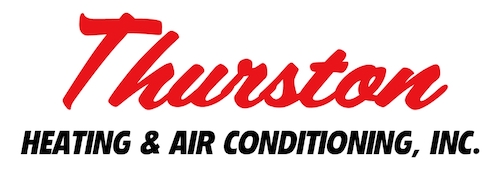
If you’re questioning whether your Kearney home has bad indoor air quality (IAQ), it likely does.
We are indoors a lot. In reality, we’re in a building up to 90% of the time, according to the U.S. Environmental Protection Agency. And the air inside homes could be 2–5 times more contaminated than outdoors, which might create long-term health problems.
Most Common Sources of Bad IAQ
We’ve put together a list of the most common sources of inferior IAQ, the troubles they make and how you can fix these indoor air pollutants. If you’re worried about the air inside your house, we recommend chatting with a pro like Thurston Heating & Air Conditioning about which products are ideal for your home.
Volatile Organic Compounds
Volatile organic compounds, or VOCs, are chemicals emitted from everyday household items.
They’re found in paint and stains along with:
- Furniture
- Carpet
- Building materials
- Cleaning products
- Cosmetics
- Air fresheners
- Candles
When these chemicals accumulate inside, they may irritate your eyes, nose and throat. They may also cause headaches and nausea. Regardless of whether your residence is in a rural or industrial area, an EPA study found indoor levels of these chemicals can be 2–5 times greater than the air outside your home.
Always follow the manufacturer’s instructions when painting or cleaning. Cracking a window can help fumes disperse faster.
Air purification systems can also make it better. This equipment partners with your heating and cooling unit to improve indoor air. When looking for a system, ensure it’s specifically made to eliminate VOCs.
Dust and Pet Dander
Dust and pet dander can aggravate health problems like asthma and allergies, especially when it continually gets recirculated by your residence’s comfort equipment. While you can vacuum more regularly and install an improved air filter, an air filtration system might be a better match.
This equipment hooks to your HVAC equipment to deliver mighty filtration. Some types provide hospital-level filtration for eliminating particles and bioaerosols.
Persistent Odors
New houses are tightly sealed to increase energy efficiency. While this is great for your utility bill, it’s not very good for your IAQ.
Stuffy odors can hang around for a greater amount of time because your house is pulling in less fresh air. As keeping your windows open all the time isn’t an option, here are two approaches you can make your indoor air smell better.
An air purification system is placed in your ducts to wipe out odors before they get released again. Find one with a carbon filter and the power to eliminate harmful VOCs. These systems can also help keep your family healthy by getting rid of most bacteria and ordinary allergy triggers like pollen and mold spores.
A ventilation system removes stale indoor air and exchanges it with fresh outdoor air. There are two models of systems (heat recovery and energy recovery), so ask our professionals for more info on which solution is best for your residence.
Unbalanced Humidity
It’s important your residence’s humidity stays even. Air that’s too moist can cause mold, while dry air can lead to respiratory issues.
Our pros suggest 40–50% for top comfort. To keep yours even, think about getting a whole-home humidifier or whole-home dehumidifier with your heating and cooling system.
Rather than having to lug a humidifier from room to room, this solution delivers balanced humidity around your house.
Carbon Monoxide
Carbon monoxide is colorless gas you can’t smell. It’s a byproduct of insufficient combustion in fuel-burning units, like gas heating systems, water heaters or fireplaces.
It poses a serious health risk. In low levels, it can lead to flu-like ailments like headaches and nausea. It could be deadly in large levels.
We suggest regular furnace maintenance to double-check your system is running smoothly. This job allows our professionals to find problems before they begin, including malfunctions that can create carbon monoxide leaks.
The best way to keep your home free of carbon monoxide is to install detectors. These alarms should be on every floor by bedrooms and living spaces.
Enhance Your Home’s Air Quality with the Thurston Heating & Air Conditioning Pros
Informed that your house has inferior air quality but not sure how to enhance it? Or unsure which solution is a good fit for you? Give our kind HVAC experts a call at 308-270-3765 or contact us online now. With free estimates and professional service, we’ll help you choose the ideal solution for your needs and budget.
